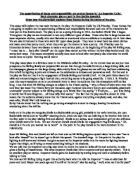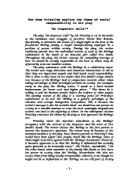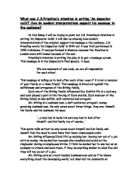The apportioning of blame and responsibility are central themes in 'An Inspector Calls'. Each character plays a part in Eva Smiths downfall. Show how the playwright explores these themes during the course of the play.
The apportioning of blame and responsibility are central themes in 'An Inspector Calls'. Each character plays a part in Eva Smiths downfall. Show how the playwright explores these themes during the course of the play. This essay will explore the two main themes in the play 'An Inspector Calls' by J.B.Priestley. These themes that I am going to explore are the apportioning of blame and responsibility between each one of the characters for their part in Eva Smiths death. The play is set on a spring Evening in 1912, Just before World War 1 began. Throughout the play we are introduced to two very different types of class. Those who live in large houses and wear expensive clothes, usually who own factories or stocks and who are oblivious to anybody not in their class. We are also introduced to those who work for upper-class people. They have to wear hand-me-down clothes and make every last penny count, when they even get the chance to have a penny. J.B. Priestley uses the interaction between these two classes to make a very serious point, at the beginning of the play Mr Birling says, " a man has to ... look after himself" yet the upper class cannot survive without the low class workers and this works both ways. This means everybody actually does need to look after everybody else otherwise the world would have no cycle! Nothing would work! This play takes place in a
What Is The Dramatic Importance Of Inspector Goole's Character In Priestly's 'An Inspector Calls' And What Things Would A Director Need To Consider When Casting This Role
What Is The Dramatic Importance Of Inspector Goole's Character In Priestly's 'An Inspector Calls' And What Things Would A Director Need To Consider When Casting This Role. In this essay I intend to discuss the dramatic importance of Inspector Goole's character in Priestly's 'An Inspector Calls'. Inspector Goole is a catalyst for the events of the play. He is calm, firm and confident. He forces, with words, the other characters to acknowledge and confess to knowing Eva Smith at one time or another. His manner also enables him to bring Sheila and Eric to the realisation of their guilt and responsibility towards the death of Eva Smith. Inspector Goole is dominating and puts a lot of pressure on the character he is questioning, this allows him to reveal the chain of events that led to the death of Eva Smith. A director would have to consider this when casting the role. Inspector Goole has a great presence, 'he creates at once an impression of massiveness, solidity and purposefulness'. Inspector Goole dominates the situation from the start and is not intimidated by Mr. Birling, Gerald Groft or anyone else in the family. Inspector Goole is always in control, '(taking charge masterfully)', he dominates the proceedings though-out the play, '(cooly, looking hard at him)', this also shows that Inspector Goole is not intimidated by anybody in the family and is in total
How is Sheila Birling Presented in Act 1 of an inspector calls
How does Priestley present Sheila Birling in act 1? At the beginning of act 1 in 'An Inspector Calls', Sheila Birling is presented as 'a pretty girl in her early twenties, very pleased with life and rather excited'. This also describes how she acts for most of act 1, until she is shown the picture of Eva Smith, and then 'she gives a half-stifled sob' which marks her first change in the novel. Her mood in act 1 switches from acting 'gaily' around Gerald to 'almost breaks down, but just controls herself', showing she is also the character most capable of change. Priestley first portrays Sheila as naïve, as she seems very 'playful' and he refers to her being possessed as she talks to Gerald. Although she is 'half serious, half playful' Priestley makes her seem more clever as she has suspicions about Gerald when she mentions 'last summer, when you never came near me'. This only becomes apparent to the reader when Gerald reveals that he had an affair with Eva Smith as well. Sheila makes an effort in act 1 to get her parents to approve of Gerald. When she receives the ring from Gerald, she is immediately 'excited', and Priestley shows this in her speech with the use of dashes as she asks 'Mummy - isn't it a beauty?'. She shows appreciation of the 'perfect' ring to Gerald which shows she really is 'pleased with life' but almost possessed by Gerald. Although the Mr and Mrs
Questions and Answers on "An Inspector Calls"
. What do we learn about each of the characters on stage in the opening stage directions? How might the actors show that the characters and pleased with themselves? In the opening stage direction we learn that four members compose the Birling's family. This family has a maid, called Edna. Arthur Birling is Sheila and Eric's father. He is a heavy-looking, rather portentous man in his middle fifties with fairly easy manners but rather provincial in his speech. Sybil, his wife, is about fifty and is rather a cold woman and her husband's social superior; and is the daughter of a more important family. Her daughter, Sheila, is a pretty girl in her early twenties, very pleased with life and rather excited. Her brother, Eric, is also in his early twenties, not quite at ease, half shy, half assertive. Also in this stage direction it is presented Sheila's fiancé, Gerald Croft, who is described as an attractive chap about thirty, rather too manly to be a dandy but very much that easy well-bred young man-about-town. 2. What tone is set in the opening exchanges between the characters? The tone set in the opening exchanges between the characters seems to be warm and kind. The whole family is celebrating a special ocassion, the engagement between Sheila Birling and Gerald Croft. 3. What does Sheila's engagement to Gerald mean to Arthur Birling? Sheila's engagement to Gerald means a
Mr. Birling and Sheila assignment on how they treated Eva Smith.
Mr. Birling and Sheila assignment on how they treated Eva Smith The two characters that I have decided to do my course work on are Mr. Birling and Sheila. Mr Birling Mr. Birling is a prosperous factory owner. He is 'a self made man.' His first priority is to make money, he quotes, 'It's my duty to keep labour cost down.' Arthur Birling is somebody who is fond of giving other people what he thinks is good advice. He always believes he has the right answers to all sorts of questions, because he has been successful where others have failed. What we find out in the play is that most of his advice is the wrong kind of advice, although he still fails to realise it. Mr. Birling Regards himself as reasonable and pays the going rate to employees. He is unable to grasp a link between actions and consequences, or wider social/world issues. He has no concepts of value other than money and position. He is proud of his status and is a social climber. He sees him & wife as upholding 'right' values and as guardians of 'proper' conduct. Mr. Birling welcomes Gerald Croft into his family as he represents a business link between his firm and that of Gerald Croft's father (a rival). He has an honest approach to life, he tells the Inspector that he wouldn't listen to Eva Smith's demand for a wage rise, 'I refused, of course' and is surprised why anyone should question why. Mr. Birling
Inspector Calls essay. Act 2. In what ways does Priestley make this such a dramatic and significant moment in the play?
. Read Act 2 from: INSPECTOR: Mrs Birling, you're a member - a prominent member- of the Brumley Women's Charity Organisation, aren't you? To MRS B ..." you have no power to make me change my mind". In what ways does Priestley make this such a dramatic and significant moment in the play? Priestly uses many different techniques to make this a dramatic and significant moment in the play. This scene really outlines the generation gap present in the play. It is obvious thorough this extract that Mrs Birling is still clearly unaffected by the news of Eva Smith's death, and her families partake in it. It is clear of the differing views of the two generations, in the extract of the play especially, as from the beginning you can see Shelia's acceptance of the need to be truthful, "Go, on mother you might as well admit it." Priestly showing Shelia's greater understanding of the situation unlike her mother who seems to still be in belief that she "...done nothing wrong."It is conveyed that Mrs Birling sees Sheila and Eric still as "children" and speaks patronisingly to them. She tries to deny things that she doesn't want to believe: Eric's drinking, Gerald's affair with Eva, and the fact that a working class girl would refuse money even if it was stolen, claiming "She was giving herself ridiculous airs."She admits she was "prejudiced" against the girl who applied to her committee
Inspector Goole functions as a mouthpiece for Priestleys ideas. What is his function? How does Priestley present him?
Inspector tor Goole functions as a mouthpiece for Priestley's ideas. What is his function? How does Priestley present him? An Inspector Calls by J.B. Priestley is a play with lots of political messages. Priestley believed in socialism and it is clear to the audience that he used 'an inspector calls' to try and convince people to his way of thinking. It was written in a time when a Labour government ruled Britain and socialist policies were starting to be seen by many and used in society. However, it is set in a time were this is the opposite. The main device Priestley uses to convey his socialist ideas is the character of the inspector. Priestley starts to use the inspector as a 'mouthpiece' straight form his introduction. As the inspector enters he creates "...at once an impression of massiveness, solidity and purposefulness." this impression continues as he progresses through his speeches and through his interrogation of the family. The Inspector remains confident, calm and composed, while people around him fall to pieces. His "solidity" is proven by the fact he remains on task despite the attempts of others, such as Birling to detract from the points he is making. The Inspector is told to appear "purposeful" in the stage directions. This is shown where he explains to Birling that his way of thinking "Every man must only look out for himself," is not the case, and
Inspector calls attiudes towards women
ATTITUDES OF WOMEN IN THE PLAY (An Inspector calls) An Inspector Calls is a play written by JB Priestley. The play discusses issues such as morality, respectability and the role of women. Within the play Priestley preaches his social views that "we are all part of one body" and reflects them as the role of the inspector .The play follows the Birling family and indeed Gerald Croft and discusses there role and reaction to the suicide of a lower class women Eva Smith. A key point that the play highlights is how willing they are to make changes, to adjust and repent .Dramatic and chronological irony is created as the play was written in 1945 and set in 1912 .It therefore allows the audience to form decisions about the characters retrospectively .In this essay I will be discussing how women are portrayed and the actions of women throughout the play. At the beginning of the play Sheila acts in a materialistic and stereotypical manner. An example of this is when she receives the ring from Gerald she states "it's perfect now I really feel engaged". This implies that the physical gift is the most important aspect which is an immature attitude towards marriage. In addition Sheila becomes upset and overwhelmed quite often, it is a stereotypical view of women to be oversensitive .This can be seen when the comment is passed to Sheila "you're behaving like a hysterical child tonight".
How does priestly make 'an inspector calls' a dramatic play?
How does priestly make 'an inspector calls' a dramatic play? Priestly uses a variety of methods and techniques to make 'an inspector calls' a dramatic play. He includes dramatic irony, tension and suspense to create a dramatic atmosphere. The whole play is set in one room with no lapses of time. This in itself creates tension and also represents the Birling family's separation from the outside world. Priestly creates an uncomfortable atmosphere from the stage directions at the very beginning of the play. "The lighting should be pink and intimate until the inspector arrives. And then it should be brighter and harder." Priestly wants to show to the audience the difference in mood when the inspector arrives. It creates dramatic tension. Tension building is also used during act 1 when the Inspector will only show the photograph to Mr Birling. "Any particular reason why I shouldn't see this girl's photograph, Inspector?" This is dramatic because the characters and the audience are not sure whether to trust the inspector. They are questioning his reasoning. Dramatic irony is used to reveal Mr Birling's character in Act1. "Some people say that war is inevitable. To that I say fiddlesticks." Judging from when the play was written and when it was set, it is clear to the audience that Priestly is showing Mr Birling to be an ignorant man who is soon to be proven wrong in his
How does Priestley create dramatic tension in Act 1 of An Inspector Calls up until the arrival of Inspector Goole?
How does Priestley create dramatic tension in Act 1 of 'An Inspector Calls' up until the arrival of Inspector Goole? 'An Inspector Calls' is a play written by J.B Priestley in 1945. Its genre is a modern detective thriller combined with a medieval morality play. J.B Priestley was an English dramatist who is recognized for writing over 50 plays; An Inspector Calls is one of his most infamous. Many plays that Priestley has written reflect his political views. He was a socialist, and was very concerned with the amount of inequality in Britain at the time. Priestley wrote 'An Inspector Calls' with the intention of conveying the idea of social discrimination to the audience through ridiculing and showing the attitude of the capitalist Birling family. Priestley deliberately set the play in 1912, although it was written in 1945. He did this because in 1912 everything was exceedingly different to the era he was writing it in. When the play was set, there were strong distinctions between gender, class and sex; whereas when the play was written those distinctions had been significantly reduced, mainly because of World War One. Priestley wanted to make the most out of those changes in the play, to make people seize the opportunity to build a more caring and equal society. Priestley creates dramatic tension throughout Act One, up until the Inspector arrives. The first few























